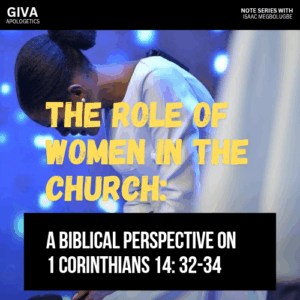
The Role of Women in the Church: A Biblical Perspective on 1 Corinthians 14:32-34
Isaac Megbolugbe
May 22, 2025
Introduction
The role of women in the church has been a topic of debate for many years, with various interpretations of biblical teachings influencing different Christian denominations and communities. One key passage that often sparks discussion is 1 Corinthians 14:32-34, where the Apostle Paul instructs women to remain silent in the churches. This article will explore the implications of this passage for the role of women in the church, arguing that the instruction is general and should be respected, with women serving in supportive roles that do not involve teaching or authoritative positions over men.
Understanding 1 Corinthians 14:32-34
The passage in question reads: “Women should remain silent in the churches. They are not allowed to speak, but must be in submission, as the law says” (1 Corinthians 14:34). At first glance, this directive might seem restrictive or even harsh. However, understanding the context of the Corinthian church and the specific issues Paul was addressing is crucial. Despite the contextual nuances, many interpret this passage as a general principle guiding the role of women in worship and church governance.
The Principle of Submission and Silence
The principle outlined by Paul emphasizes submission and silence for women in the church gatherings. This submission is not about worth or value but about roles and order in the church. The passage clearly states that women are to be in submission, which many understand as a directive for them not to teach or exercise authority over men in the church.
Service Roles for Women in the Church
While the instruction for silence and submission might seem limiting at first, it actually opens up a wide array of service roles for women within the church that do not involve teaching or leading men. Women can and should play pivotal roles in:
1. Women’s Ministries: Leading and teaching within women’s groups, Bible studies, and fellowships focused on nurturing and discipling women.
2. Support and Care: Providing care and support to the congregation through visitation, prayer, and acts of kindness.
3. Children’s Ministry: Teaching and caring for children, both in Sunday school settings and other children-focused ministries.
4. Missions and Outreach: Engaging in evangelistic efforts, social services, and missionary work, both locally and globally.
5. Administrative Support: Assisting in various administrative capacities within the church, ensuring the smooth operation of church activities.
These roles allow women to use their gifts and talents to serve the body of Christ while respecting the biblical principle of submission and the distinct roles outlined in Scripture.
The Influence of Feminism
Unfortunately, the church has not been immune to the influence of secular ideologies like feminism, which often advocates for roles and equality in direct contrast to biblical teachings. This influence has led some churches to ordain women as pastors and ministers in the same capacity as men, which many believe directly contradicts biblical principles.
The Sin of Disregarding Biblical Roles
Disregarding the biblical roles and ordaining women into teaching and authoritative positions over men can be seen as a sin, according to many interpretations of Scripture. This view holds that such actions go against the clear instructions of the Bible regarding order and submission in the church. By adhering to these roles, the church maintains its integrity and faithfulness to Scripture.
Conclusion
The role of women in the church is a vital topic that requires careful consideration of biblical teachings. While 1 Corinthians 14:32-34 might seem restrictive to some, it actually provides a framework for women to serve in meaningful and impactful ways within the church. By focusing on supportive roles and leading within women’s groups, women can fulfill their callings while respecting the principle of submission. The church must remain vigilant against ideologies that seek to alter biblical teachings, ensuring that it stays true to the Word of God.
In honoring these biblical roles, the church not only obeys Scripture but also creates a space where both men and women can serve according to their God-given gifts and callings, ultimately advancing the kingdom of God.